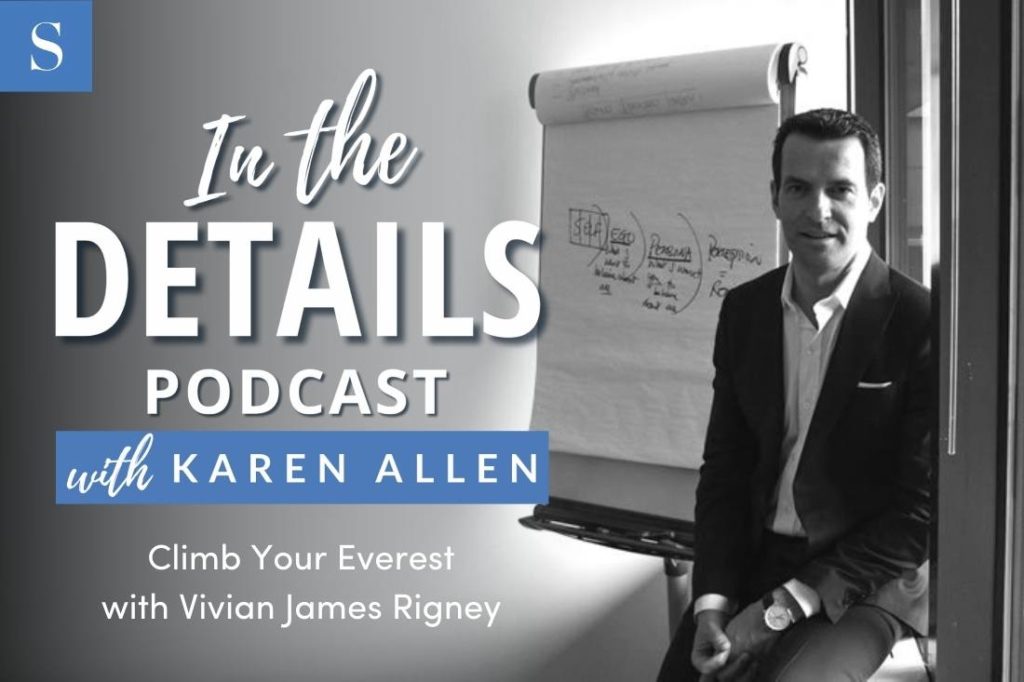When you think of overcoming challenges, climbing Mount Everest gets top billing. And if you can conquer Everest, what else might you be able to tackle?
On this week’s episode of In the Details, host Karen Allen talks with Vivian James Rigney, who has climbed all seven summits (including Everest) and is also the president and CEO of executive coaching agency Inside Us LLC. Rigney discusses the lessons he took from Everest and their applicability to day-to-day life, from lessening the noise to finding daily peace.
In the Details with Karen Allen is no longer releasing new episodes on the SUCCESS Podcast Network, but you can still listen to the full conversation below.

When it’s loud, find a decoy
Rigney often had both a ‘good angel’ and a ‘bad angel’ on his shoulder during his Everest ascent. His negative inner dialogue told him the ladder looked dodgy and he hated heights, while the positive inner dialogue peppered his thoughts with his climbing experience, the people behind him, etc. His mind became overwhelmed with noise, which depleted his energy and put his safety at greater risk. Therefore, Rigney envisioned a decoy, or a thought that was bigger and better than the noise, and it brought him peace.
When you’re able to conjure up a peaceful thought during times of stress, it can help reduce the noise level, allow you to breathe deeply and separate the truth from thoughts not based in reality. This decoy thought gives you enough space from negative energy to bring yourself into a state of composure that enables you to take a productive step forward. It’s a moment of peace to ground yourself.
So what would your decoy thought be? Have it at the ready for when you encounter stress.
Every day is a reset
Rigney has a daily habit to help him find inner peace and stillness, even while living amid the hustle and bustle of New York City. From his 46th floor apartment, he can see the sunrise in the morning, and with it welcomes the idea of resetting. It’s easy to get caught up in our busyness or stress, but when we recognize that each day is a new one, we allow ourselves the room for so many possibilities.
Perspective is key
Bringing ourselves back to a peaceful space is all about focusing on a different thought, not necessarily the loudest one. Rigney shared a story about a client who was facing both work stress and the stress of building a new home, and felt overwhelmed and unsure of his next step. Rigney recommended that the client listen to the guidance of his intuition, and that he focus on an aspect of his life that was going exceptionally well, yet which he hadn’t mentioned: his family. When the client had an appreciative lens for things, and a different place to focus, he was able to lessen his stressful feelings and develop a more peaceful energy. This logic helped bring him into a more grounded space and counter the emotions exacerbated by stress.
Only worry about what you control
Rigney discussed how there are many uncertainties climbers are unable to prepare for, which can shake them, since humans love predictability. It’s something we’re all facing as we emerge from the pandemic—people are looking for terra firma, and things have changed so much that certainty can be hard to come across. That’s when, Rigney believes, you need to make a clear distinction between things you can control and things you can’t control. With things you can’t control, your fretting and worrying is a waste of energy and produces no return. This worry is often the result of being hijacked by our emotions, which occurs more than we think and may be due to a habit from the past, how our parents acted, our childhood, etc.
However, in the present, when you dwell on your experiences you give life to your thoughts—which is pointless when something is out of your control. Think of carrying heavy bags, and the relief your arms would feel when you could put down the ones that weren’t yours to hold. The only things we have control over are our own thoughts, actions and words.
Importance of meditation and recharging
Choosing a different path in our mind and mastering awareness of our negative thought patterns is not an easy task. But we can strengthen this internal muscle through meditation, which helps us learn to be okay with being still and present. The subconscious might initially push back against changing the status quo, but through discipline and making the time to practice, your brain will eventually realize the benefits of meditating. And we can balance the stillness through activities that bring us good energy, whether that’s being in nature, working out, watching a funny movie, or spending time with family and friends. What will help rebuild your energy reserve when it’s depleted? The answer is different for different people.






